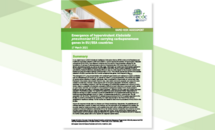Rapid risk assessment - Emergence of hypervirulent Klebsiella pneumoniae ST23 carrying carbapenemase genes in EU/EEA countries - first update
Since the last ECDC rapid risk assessment in 2021, the number of European Union/European Economic Area (EU/EEA) countries reporting cases of hypervirulent Klebsiella pneumoniae (hvKp) sequence type (ST) 23 has increased from four to 10 countries, and the number of isolates submitted for analysis by these countries has increased from 12 to 143 isolates.
Executive Summary
Furthermore, there is now evidence of sustained spread of the globally dominant hvKp ST23-K1 lineage carrying carbapenemase genes between healthcare facilities in Ireland over a period of five years, despite enhanced control efforts. Clusters of hvKp ST23-K1 isolates signifying potential within-country transmission were also detected in France, Latvia, and Lithuania; however, these have so far not been confirmed as being most likely due to within-country transmission with epidemiological data. Similar spread in and between healthcare facilities may already occur in other EU/EEA countries with less established surveillance.
The emergence of K. pneumoniae isolates with combined hypervirulence and resistance to last-line antibiotics such as carbapenems is of concern as, in contrast to ‘classic’ K. pneumoniae strains, hvKp strains can cause severe infections in healthy individuals, often complicated by dissemination to various body sites. Previously, hvKp strains were primarily found in Asia, were mainly community-acquired, and were only rarely resistant to antibiotics. However, recent reports point to increasing geographic distribution, healthcare association and multidrug resistance. With the convergence of virulence and antimicrobial resistance in hvKp strains, there is a possibility of potentially untreatable infections in previously healthy adults. An even higher morbidity and mortality must be expected if carbapenem-resistant hvKp strains spread in healthcare settings and affect a vulnerable patient population. Sustained transmission of hvKp ST23 carrying carbapenemase genes between healthcare facilities in an EU/EEA country has been confirmed. The probability of further spread and establishment of hvKp carrying carbapenemase genes in healthcare settings in EU/EEA countries with consequent significant impact on morbidity and mortality is therefore currently considered to be high.
It is important to detect hvKp early and prevent further dissemination in healthcare settings in EU/EEA countries to avoid further establishment of hvKp carrying carbapenemase genes as a healthcare-associated pathogen. Options for response include alerts to clinicians and clinical microbiology laboratories, the establishment of sufficient laboratory capacity to detect hvKp isolates including whole-genome sequencing, the submission of all suspected hvKp isolates with or without additional antimicrobial resistance to national reference laboratories, and enhanced infection prevention and control measures in healthcare facilities. Prospective data collection on hvKp isolates, including epidemiological and clinical data on cases of infection, carriage and associated risk factors, would improve the understanding of national spread and transmission routes and determine the need for further surveillance
Download








